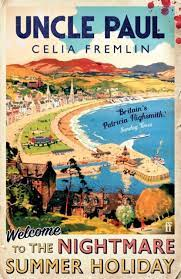Uncle Paul was Celia Fremlin's second novel, published in 1959 after the tremendous success of her debut, The Hours Before Dawn, which duly won an Edgar award from the Mystery Writers of America. This novel is much less well-known, but pleasingly it enjoyed a new life last year, and was a Waterstones Thriller of the Month in a handsome new edition published by Faber, who marketed it with the tag-line: 'Welcome to the Nightmare Summer Holiday'.
We see things through the eyes of Meg, a young woman who is summoned by her sister Isabel to a seaside caravan because their older half-sister Mildred needs help. There's a cottage at the seaside, where fifteen years ago Mildred's first husband, the mysterious 'Uncle Paul' of the title, was arrested for attempted murder. Now, it seems, Paul may have been released for prison and may have returned to the scene of the crime.
Fremlin juggles various ingredients in this story. There are occasional 'Had-I-But-Known' touches: 'Meg smiled...She could not guess then, how soon and in what circumstances, she'd be recalling those words of Isabel's.' And she pokes fun at the Golden Age cliches, when discussing a book called Murder for Two: 'she's got such a cast-iron alibi that I think it must be her.' 'Don't be too sure,' Freddy said darkly. 'They tend to double-cross you nowadays.' And there is some excellent social comedy, with Fremlin's characteristically sharp observation. The dampish English summer holiday is wonderfully evoked, and there's a marvellous young boy called Cedric, a know-all whom everyone would really love to throttle. He also plays a part in the plot. As usual with Fremlin, the adult male characters are shadowy and generally less convincing than her women.
As an attempt to surmount the 'second novel hurdle' that confronts authors who have written a great first book, Uncle Paul is an interesting case study, because it showcases Fremlin's considerable gifts, but also illustrates her weaknesses. There is suspense and a sense of menace and threat, but the tension is dissipated because things move too slowly, with too much padding. The problem is that the plot is flimsy and the ending something of a let-down (this appears to be a widespread reaction, judging by reviews that I've read). At this point in her career, Fremlin was, I think, trying to figure out how to structure a suspense novel successfully. In a number of her later books, as well as in her debut, she managed to do so splendidly. Here, she doesn't get the balance right.

Nice reminder...I have some Celia Fremlins in by bookcase, I need to revisit.
ReplyDelete